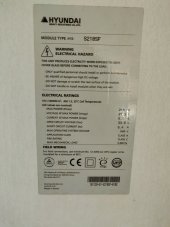Hey all! Simple newb question. Bought some used panels that specify Voc 33.8V (Vmp 27.2V), but when I measured one panel's voltage in shade with a multimeter its voltage showed up as 55V. I thought it shouldn't ever get over Voc specified. Does that mean it's trash and I shouldn't attempt to connect it? What sort of fault is this and what are the physics behind this unexpectedly high voltage? Can this panel still be salvaged?
I thought about connecting 3 of those to Ecoflow Delta Max in series and it has 100V max solar input, so concerned it'll burn the unit. I'll measure the rest of them when I get back to the acreage in a couple of days.
I thought about connecting 3 of those to Ecoflow Delta Max in series and it has 100V max solar input, so concerned it'll burn the unit. I'll measure the rest of them when I get back to the acreage in a couple of days.



